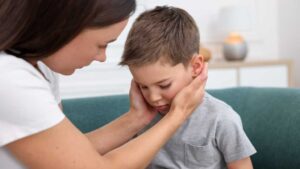Autism diagnoses have increased drastically over recent years, prompting the Centers for Disease Control and Prevention (CDC) to expand their estimates to one in 36 children under eight years likely to qualify. But the growing awareness includes more and more parents asking, “What causes autism?” ABA Centers of Florida understands the desire for a bottom-line answer to such an important question, so we prepared this blog to explore possible autism causes and the best options for moving forward.
While many theories and studies link certain genetic and environmental factors, none have definitively declared what causes autism. However, it is helpful to know the factors that could potentially increase the risk of having autism. Looking at what scientists have identified as potential autism causes, let’s discuss what to do when your family receives an autism diagnosis.
What Causes Autism? Common Potential Sources
Research has determined that potential causes of autism could be genetic, biological, environmental, or a combination of factors. In other words, there is no single cause of Autism Spectrum Disorder (or ASD). So, rather than looking for one main cause, let’s review the various risk factors.
Autism Causes: Genetic Risk Factors
Select gene changes can increase the risk of genetic autism, and the parent may never know. A parent does not have to have autism for their child to receive an ASD diagnosis. They may be carriers of one of the gene changes and have no idea. Fragile X syndrome and other genetic disorders also demonstrate links to autism.
One documented risk is having a sibling on the spectrum. Genetic risk factors increase with the parent’s age, premature births, and low birth weights. Such risks also extend to twins, multiples, and babies born less than a year apart.
Autism Causes: Biological Risk Factors
According to recent studies, random or spontaneous gene mutation may contribute to what causes autism. These spontaneous gene mutations occur randomly in the egg or sperm during fertilization rather than anything from the parents. The mutation can then occur in each cell as the fertilized egg divides itself.
What happens with these mutations? The prevalent theory is that mutation can affect entire DNA strands or a single cell. When a full strand of DNA is affected, multiple genes may be duplicated or deleted. Studies show that people without autism have fewer duplicated genes than those diagnosed with ASD.
While the spontaneously mutated genes do not appear to cause autism, genetic risk factors do seem to increase the likelihood.
Autism Causes: Environmental Risk Factors
While scientists have yet to determine what environmental factors lead to a greater risk of autism precisely, the research community agrees that environmental factors do exist, but the testing is new and ongoing. One focus has been possible environmental factors during a pregnancy, which include:
- Certain prescription drugs (such as valproic acid or thalidomide)
- Exposure to heavy metals
- Exposure to toxins and chemicals in the environment
Since the research regarding environmental risk factors is new, there are controversies involved. That said, several studies demonstrate a link between exposure to some conventional cleaning and personal care products with brain development in the womb.
As scientific research continues, we are optimistic that more answers will come to light regarding genetic, biological, and environmental factors and what causes autism.
What Causes Autism? Exploring the Myths
One study conducted in 1998 explored the potential link between ASD and childhood vaccines. Several years later, a series of additional studies found no such evidence. Scientists from the initial study even retracted their statement about the connection between vaccines and autism in 2010. Unfortunately, seeds of doubt took hold, and vaccines remain a scapegoat regardless of how safe they have since proven to be.
What’s the Link Between Autism Causes and Autism Diagnoses?
While the causes of autism have yet to be determined, skeptics look to the diagnosis process to better understand how it might develop. Multiple common autism symptoms contribute to a diagnosis, starting in toddlers as young as 18 months old. These early signs of ASD include:
- Little or no eye contact
- No baby talk or babbling
- No response to hearing their name
- No pointing
- Unable to make 2-word sentences together by the age of two
- Underdeveloped social awareness or responsiveness
- Obsessive-compulsive signs, such as constantly lining up toys a certain way
It’s important to schedule developmental checkups (18 months and older) as early signs can be difficult to detect.
- Signs of autism become more apparent as children get older, such as:
- Severe adherence to routines
- Intense focus on objects or topics
- A difficulty or disinterest in making friends
- Repetitive language patterns
- An inability to carry on a conversation with others
Consult your pediatrician to arrange an evaluation if you notice these signs in your child. The next steps will then include a medical specialist, such as a psychologist, psychiatrist, or neurologist, conducting a full autism evaluation to test language and cognitive skills, as well as a DNA test to look for genetic mutations. A hearing test may be included for kids who have not developed speech before then.
The evaluation process can feel long and intense, but a formal diagnosis is required to move forward with treatment for your child or loved one.
Treatment Options No Matter the Cause
Autism impacts people from all ethnic, racial, and socioeconomic groups. So why does it appear to be more common in males than females? Unclear. Some researchers theorize that young boys are diagnosed more often because young girls are more adept at mimicking social behavior and masking their symptoms. Still, it’s just another mystery in the vast tapestry that is autism causes and treatments.
There currently is no cure for autism. However, education and behavioral interventions have been proven to help reduce the intensity of symptoms, especially when introduced to those still developing social and language skills.
Trained educators, therapists, and behavioral aids all focus on the individual’s skills to influence their behavior. Applied Behavior Analysis, the ABA in ABA therapy (and ABA Centers of Florida), is an evidence-based treatment for autistic children, teens, and adults that targets:
- Developing social and communication skills
- Building inherent strengths
- Creating alternatives to unwanted behavior
- Learning critical life skills
ABA therapy is a comprehensive treatment that greatly complements other forms of autism, such as occupational therapy.
At ABA Centers of Florida, activities used in treatment for children can include playing, getting dressed, sitting, communication skills, attention and focus, potty training, self-care, and much more.
ABA Centers of Florida works with toddlers and pre-k kids to prepare them for success in the school environment. And our after-school programs for older children offer high-quality training and treatment during the most formative years.
ABA Centers of Florida offers parent training for parents of kids with autism and therapy options for adults with autism. Among the best parts of ABA therapy is that it isn’t a one-size-fits-all treatment. Our treatment is customized to an individual patient’s needs as everyone with autism has different strengths and struggles.
Medical Treatment Over Autism Causes
While there is no medication that “cures” autism, there are many options to help reduce symptoms. Many with autism also struggle with anxiety, obsessive-compulsive behaviors, attention deficit disorder, and depression. A physician can prescribe medications to treat such issues, which makes life much easier for the autistic person experiencing the challenges and their caregivers. Be sure to consult a skilled doctor before starting any medication.
ABA Centers of Florida Wants to Be Your Resource for Everything ABA Therapy
We understand how frustrating it can be to have no exact cause when a family member has been diagnosed with autism. It’s a big part of why we aim to provide the help and support they need.
Early intervention is the best path to success for autistic children when it comes to treatment options. Be sure to have your child evaluated for signs of autism early (18 months) and schedule important checkups. Discuss any signs you see so your pediatrician can determine if a full evaluation is necessary.
If the evaluation and diagnosis return positive for ASD, the good news is you can begin exploring treatment options immediately. ABA therapy is a customizable, evidence-based treatment for autism that focuses on each child’s innate skills and strengths.
Contact us here for a free consultation or call (877) 999-0258 with any questions you may have. We’re here to help.








